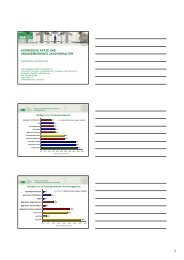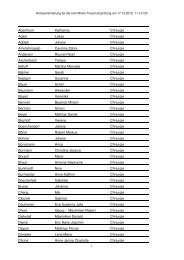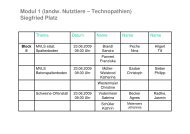Die Rinderhaltung im Ökologischen Landbau - eine tiergerechte ...
Die Rinderhaltung im Ökologischen Landbau - eine tiergerechte ...
Die Rinderhaltung im Ökologischen Landbau - eine tiergerechte ...
Erfolgreiche ePaper selbst erstellen
Machen Sie aus Ihren PDF Publikationen ein blätterbares Flipbook mit unserer einzigartigen Google optimierten e-Paper Software.
5. Summary<br />
The cattle farming in the sustainable agriculture – a pro an<strong>im</strong>al and environmentally<br />
acceptable alternative?<br />
The ecological way of management has been regarded as being 'unharmful to an<strong>im</strong>al welfare'<br />
and is considered 'environmentally acceptable'. The a<strong>im</strong> of this work was to analyse the cattle<br />
farming in the sustainable agriculture on behalf of this characterization.<br />
The German agriculture is undergoing a process of restructuring which includes a declining<br />
development of the conventional agriculture and a considerable boost of interest in the sustainable<br />
agriculture. Long-range international and national political decisions in agricultural<br />
affairs and the behaviour of the consumer, which is also strongly influenced by the current<br />
events, are taking part in these proceedings. The lawful basic standards for the ecological way<br />
of management are fixed in the ordinance 2092/91/EWG. It contains essential elements for a<br />
pro-an<strong>im</strong>al and environmentally acceptable form of economy, i.e. reduced stocking rate, cla<strong>im</strong><br />
of outside pen and bedded husbandry systems for the an<strong>im</strong>als, closed farming cycles, groundbased<br />
production as well as the renunciation to buy additional means of production. In the<br />
progress of reflecting on the ecological cattle farming with the legal background in mind, it<br />
was possible to collect crucial information on the insufficient general conditions.<br />
The difficulties that arose can be parted into universal and system-<strong>im</strong>manent problems. Most<br />
of the problems are of general character, which means the reasons lie partly in the state of the<br />
overall economical circumstances (i.e. government funds) and partly in the farm structure<br />
itself (specialization tendency: bigger farms related to kept cattle numbers and cultivated<br />
area), but also in the husbandry conditions (tether conditions, litterless systems etc.) and management<br />
(faulty consciousness and the special knowledge of the farmer). Only few of the<br />
problems mentioned are to be called system-<strong>im</strong>manent which means their origin lies in the<br />
general concept of sustainable agriculture.<br />
Here are to put forth: deficit regulations in the ordinance 2092/91/EWG (i.e. spatial requirements,<br />
housing conditions, special husbandry system), inconsequent transfer of preconditions<br />
(i.e. supply of litter, guarantee of outside pen) as well as problems in the sector of an<strong>im</strong>al<br />
feeding (energy and protein supply) and an<strong>im</strong>al health (i.e. population care models, development<br />
of health plans, knowledge of alternative treatment methods).<br />
142





